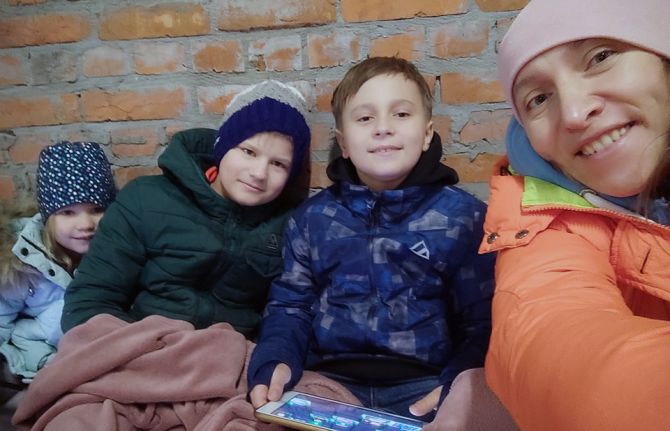

Feature Story
Quick thinking and planning instrumental for HIV network in Ukraine
08 March 2022
08 March 2022 08 March 2022When shelling awoke Valeriia Rachynska in Kyiv on 24 February, the first day of the conflict, she rolled over and tried to get more sleep. As a native of Luhansk, she had already lived through the 2014 conflict.
“I think my brain analysed the noise and realized I was out of harm’s way,” she said by videoconference from a small village in western Ukraine. “But when I saw my kids crying and frightened, I knew I had to relocate yet again.”
The following night she and her two sons stayed in a bomb shelter and then left their home in the capital city with her brother and his family.
As the Director of Human Rights, Gender and Community Development of 100% Life, the largest network of people living with HIV in Ukraine, she stressed that in order to continue helping people, she needed to relocate to a safer place.
“It’s like when you are in an airplane and there is a lack of oxygen,” Ms Rachynska explained. “You put the mask on yourself first then place it on others afterwards.”
The key for her and her organization was being able to have Internet access, a steady mobile phone service, open banks and a relative sense of safety. These days she felt like she was operating a switchboard.
“I respond to all calls and try to redirect them to the right people,” she said. “It has been non-stop and because there are so many attacks and so much unpredictability, I can only advance one step at a time.”
She credits 100% Life’s head, Dmytro Sherembey, for having done advance planning ahead.
“A lot of people told us, “You are crazy to panic,” but at 100% Life we moved our computer servers, documents and anything deemed sensitive to western Ukraine and even Poland and Germany.”
Some of her colleagues stayed in Kyiv saying they would tough it out, but 10 days later many of them left too.
“We are now focusing on evacuations and relocation for people living with HIV and their families as well as marginalized groups by hiring buses for them,” Ms Rachynska said, wrapped up in a blue sweatshirt with a hood. “For those not living in Kyiv, we are sending money via bank transfers for them to buy food and other essentials.”
The country has enough buffer stocks of HIV medications to last until April, but with the help of international partners and UNAIDS’ coordination, 100% Life has urgently planned to have additional life-saving medicines delivered to Poland. The Polish Government has secured a warehouse and agreed to help with logistics, getting antiretroviral therapy to people living with HIV in Ukraine.
Ukraine has the second largest AIDS epidemic in the region. It’s estimated that 250 000 people live with HIV in Ukraine, with more than half on antiretroviral therapy, medication that needs to be taken daily for people living with HIV to stay healthy.
“Our biggest challenge right now is to save lives, provide security and have people stay on treatment,” she said. The 100% Life network has already redesigned key aspects of its programme to get funding from the Global Fund to Fight AIDS, Tuberculosis and Malaria to meet the immediate needs.
Having joined 100% Life in 2011, Ms Rachynska has seen the strides that Ukraine has made to reverse the AIDS epidemic. She is particularly proud of the positive impact that harm reduction programmes, including opioid substitution therapy and needle–syringe exchanges, have had in Ukraine to reduce new HIV infections. HIV in the country continues to disproportionately affect people who inject drugs and the ongoing military offensive may hamper substitution therapy options. She said that 100% Life was actively working to avoid that.
Her other worry involved protecting sex workers, lesbian, gay, bisexual, transgender and intersex people and people who inject drugs. Based on the violence and stigma those groups experienced during the conflict in eastern Ukraine, she fears that key populations will be the targets of violence.
“Our next task will be to start and monitor human rights violations,” she said. “This is very important to me.”
Region/country
Related
 Women, HIV, and war: a triple burden
Women, HIV, and war: a triple burden

12 September 2025
 Displacement and HIV: doubly vulnerable in Ukraine
Displacement and HIV: doubly vulnerable in Ukraine

11 August 2025

